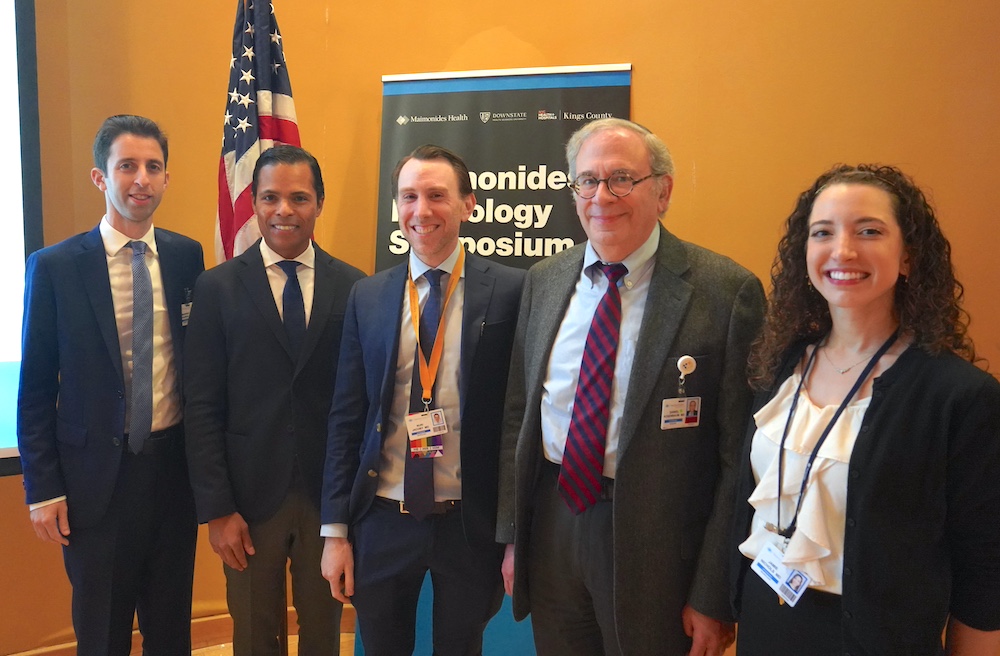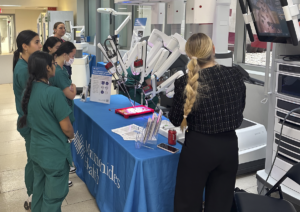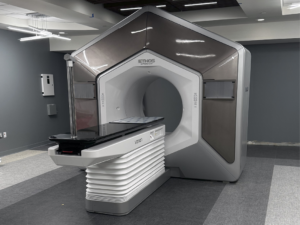The inaugural Maimonides Neurology Symposium, held on Nov. 14 at Maimonides Medical Center, brought together more than 200 neurology specialists, primary care physicians, trainees, and non-physician staff, underscoring Maimonides’ leadership in neurological care and research. The event featured diverse sessions, marking significant strides in transforming the field.
The event was spearheaded by Nuri Jacoby, MD, Vice Chair of Neurology at Maimonides Medical Center and Associate Professor of Clinical Neurology at SUNY Downstate Health Sciences University. According to Dr. Jacoby, transformative advancements have been made in the field over the past decade, with treatments once unthinkable for conditions like spinal muscular atrophy, myasthenia gravis, and Alzheimer’s Disease now becoming widely available.
“When I first began my residency in neurology in 2009, there were limited treatment options for many neurological conditions, but that is different today,” he said. “The field is advancing rapidly, with truly groundbreaking therapies.”
The success of the symposium represents Dr. Jacoby’s vision to create a setting to foster knowledge-sharing among the region’s neurology and primary care specialists. The symposium also highlights the clinical expertise of the expanding Maimonides neurology team, which has grown to 11 specialists providing advanced neurological care to the Brooklyn community for a range of conditions.
Clinical Collaboration Bolstering Expertise and Innovation in Brooklyn
Presented by Maimonides Neurosciences Institute in partnership with the Brooklyn Neuroscience Center at NYC Health + Hospitals/Kings County and SUNY Downstate Health Sciences University Department of Neurology, the symposium spotlighted advances in neurologic patient care in Brooklyn through clinicians’ combined clinical expertise, research efforts, and educational impact.
“Our partnership enables us to leverage collective knowledge to advance patient care and support a broader medical community,” Dr. Jacoby says.
Symposium Highlights: Advancing and Expanding Treatment Options
The day began with a welcome address from Daniel M. Rosenbaum, MD, Distinguished Service Professor & Chair of Neurology at SUNY Downstate Health Sciences University and Regional Chair of Neurology at Maimonides Medical Center, setting the stage for sessions highlighting significant advances.
Innovations in Multiple Sclerosis (MS) Treatment
Attendees explored transformative advancements in neuroimmunology, especially in multiple sclerosis (MS) care, in a session led by Jamie Nichols, MD, Attending Physician in Neurology at Maimonides and Assistant Professor of Neurology at SUNY Downstate Health Sciences University. Historically, treatments reduced MS relapse rates by only 20-30%1, leaving many patients experiencing frequent relapses. During these relapses, patients might lose vision, experience instability, or develop weakness, often requiring hospitalization and IV steroids to improve—though many would not fully return to their baseline level of function. This “relapsing-remitting” pattern characterized most MS cases, impacting long-term quality of life.
In recent years, greater medical therapies have emerged for MS, dramatically reducing relapse rates by as much as 67%2. These advancements mark a fundamental change, with early indicators suggesting they may significantly slow disease progression, potentially lessening the long-term debilitation many patients face.
Maimonides, long recognized as an MS Center of Excellence by the National MS Society, provides specialized care that enables patients to lead fuller lives. With new therapies emerging annually, Maimonides remains at the forefront of MS treatment, continuously advancing treatments.
Advancements in Myasthenia Gravis and Neuromuscular Care
Myasthenia gravis (MG) is a neuromuscular disorder impacting both younger and older patients. MG affects the neuromuscular junction, disrupting the nerve-muscle connection due to autoimmune antibody attacks. Symptoms include double vision, difficulty swallowing, and even severe breathing difficulties, which can be life-altering for many patients.
Historically, MG treatments were limited to general immunosuppressants and steroids, which were not specifically approved for MG. Patients experiencing exacerbations often faced hospitalization and sometimes required ICU intubation.
“Before 2019, I had multiple patients frequently hospitalized due to exacerbations. It was hard to see the impact this had on their lives,” Dr. Jacoby recalls.
In his symposium session Updates in Peripheral Nerve and Neuromuscular Junction Disorders, Dr. Jacoby presented on research and best practices developed over the last five years that has helped uncover MG’s unique pathophysiology and led to new, targeted treatments. These advancements include two new classes of medications, each with multiple drugs approved in the last few years, and a third class expected to be available soon.
They focus on specific MG-related antibodies that significantly reduce exacerbations and enable patients to remain out of the hospital.
“These treatments have completely changed the paradigm,” Dr. Jacoby explains. “Where patients were once routinely in the ICU, now it’s much less common. My patients are doing well, and it’s truly encouraging as a neurologist to offer these new treatments and see such positive outcomes.”
Beyond MG, neuromuscular care is advancing in other conditions as well. During the symposium, Yaacov Anziska, MD, Director of SUNY Downstate’s Muscular Dystrophy Association Clinic, presented on the advances in genetic neuromuscular disorders. He discussed how patients with Spinal Muscular Atrophy (SMA) and, more recently, Duchenne muscular dystrophy, have benefited from gene therapy. Both of these disorders, like MG, previously had limited options that could not effectively alter their progressive course. Gene therapy has changed the clinical course of SMA so that children with severe SMA—who previously would likely not have been able to sit up or even survive past the second year of life—are now walking and attending school with their classmates.
“It’s incredibly rewarding to be part of these breakthroughs. Being able to offer my patients treatments that genuinely improve their lives—it’s why I love my work.”
Surgical Advancements in Epilepsy Care
Epilepsy care has also evolved, with surgery now recognized as critical for many drug-resistant cases. While antiseizure medications remain a cornerstone of treatment, approximately one third of patients living with epilepsy have seizures that cannot be controlled with medications alone. Research shows that if a patient fails to respond to one medication, the likelihood of success with additional drugs is significantly lower.
“Consequently, there is an increased emphasis on early consideration of surgery for patients with drug-resistant epilepsy, a shift driven by leading neurology associations and epilepsy specialists,” Benjamin Cunningham, MD, Director of Epilepsy at Maimonides Medical Center, said in his symposium presentation, which focused on the non-pharmacologic treatments of drug-resistant epilepsy.
Maimonides’ epilepsy team includes three specialists. In addition to Dr. Cunningham, this team includes Susanna O’Kula, MD, an expert in pre-surgical planning who recently joined from SUNY Downstate, and Dr. Grigoriy Gutin, MD, PhD, who is involved throughout the spectrum of care in his dual role of neurohospitalist-epileptologist at Maimonides. Their combined expertise is pivotal in assessing candidates for epilepsy surgery through detailed pre-surgical evaluations, including video EEG monitoring and other tests to precisely locate seizure origins. Careful pre-surgical planning minimizes risks, especially when seizures originate near critical motor or language centers in the brain. For many patients, surgery dramatically reduces or even eliminates seizures, significantly enhancing quality of life.
Some patients suffer from drug-resistant seizures that occur from critical areas of the brain that cannot be surgically removed, or seizures that occur from more than one location in the brain. These individuals ultimately may not be eligible for traditional epilepsy surgery, but remain good candidates for treatment with an implantable neurostimulation device. These devices provide stimulation to the brain to reduce seizures, and the therapeutic effect of these devices actually increases over time.
While epilepsy surgery might seem intimidating, the procedures have been refined to prioritize patient safety. Educating patients about these options is a priority, as surgery, though complex, can offer transformative outcomes for those struggling with frequent seizures.
Maimonides currently refers patients needing surgical intervention to specialized centers, while handling all epilepsy pre-surgical planning and postoperative care in-house, allowing patients to receive continuous support close to their homes.
Diagnosing and Treating Alzheimer’s Disease
Recent breakthroughs in Alzheimer’s disease are transforming both diagnostic accuracy and treatment options, marking a pivotal shift for specialists and general practitioners. Traditionally, Alzheimer’s diagnosis relied on patient history and neurological examination, including cognitive testing. MRI was used mainly to rule out other conditions. This led to a diagnostic accuracy of only 60-70%, even among dementia specialists. This gap left room for misdiagnoses, often resulting in delayed or less effective management.
New biomarker-based diagnostics, however, are improving precision. Among these tools, the amyloid PET scan can detect amyloid deposits in the brain—a key indicator of Alzheimer’s. Recently covered by Medicare, this scan is now more accessible. Lumbar puncture also offer reliable diagnosis, although it is more invasive. Even more accessible options are on the horizon, as blood tests for Alzheimer’s biomarkers are expected to become widely available, providing a less invasive and cost-effective alternative.
These diagnostic advancements are significant, given new treatment options.
Anti-amyloid treatments such as lecanemab (approved in 2023) and donanemab (approved in July 2024) have shown promise in slowing disease progression. While not cures, these treatments help delay cognitive decline, benefiting patients in the early stages of Alzheimer’s. The therapies carry some risk, but they represent a promising step forward in Alzheimer’s care.
Maimonides is preparing to launch a dedicated Alzheimer’s clinic, one of only a few centers in New York City to offer these innovative treatments. This clinic will expand access to cutting-edge therapies and serve as a resource for patients and families, reinforcing Maimonides’ commitment to pioneering solutions in neurological health.
Expert Knowledge for Specialists and Community Providers
Timed to highlight recent FDA-approved treatments across neurology, Dr. Jacoby explained, “The symposium provided an opportunity to share new insights with fellow neurologists, primary care doctors, and the broader community.”
Primary care providers, often on the front line for conditions like migraines, increasingly manage neurological cases due to the shortage of specialists and the growing array of FDA-approved therapies, and staying up to date on this rapidly advancing field is critical to helping patients get the results they need.
Plans are in place for a second annual symposium in November 2025, which Dr. Jacoby envisions as an evolving event with a different theme and expanded speaker lineup each year.
See highlights of Maimonides Neurology Symposium at https://maimo.org/treatments-care/stroke-and-neurosciences/1st-annual-maimonides-neurology-symposium/. For more information about Maimonides Neurosciences Institute, visit https://maimo.org/treatments-care/stroke-and-neurosciences/. To refer a patient, call (718) 283-7470.
1: Cross A, Riley C. Treatment of Multiple Sclerosis. Continuum (Minneap Minn). 2022;28(4):1025-1051
2: Cross A, Riley C. Treatment of Multiple Sclerosis. Continuum (Minneap Minn). 2022;28(4):1025-1051




